
If you’re considering the Individual Coverage Health Reimbursement Arrangement (ICHRA) for your organization, it’s essential to understand the tax implications for both employers and employees.
In today’s blog post, we’ll break down the tax aspects of ICHRA to help you make informed decisions about this flexible healthcare option.
If you’re new to ICHRA, check out our comprehensive ICHRA Guide!
Ready to dive into the tax details? Let’s explore the tax implications of ICHRA for employers and employees.
Tax Benefits for Employers
Employers can enjoy several tax benefits when offering an ICHRA plan:
Tax Deductibility: Employer contributions to an ICHRA plan are tax-deductible as a business expense, reducing the overall taxable income for the organization.
No Payroll Taxes: ICHRA reimbursements are not subject to payroll taxes, such as Social Security, Medicare, or federal unemployment taxes.
No Annual Contribution Limits: Unlike other healthcare reimbursement arrangements, such as Health Savings Accounts (HSAs) or Flexible Spending Accounts (FSAs), there are no annual contribution limits for ICHRA plans, allowing employers to tailor their contributions based on their budget and employee needs.
Tax Benefits for Employees
Employees also benefit from tax advantages when participating in an ICHRA plan:
Tax-Free Reimbursements: As long as employees maintain minimum essential coverage (MEC), their reimbursements for eligible expenses under an ICHRA plan (which would include the monthly premium!) are tax-free. This means that reimbursements do not count as taxable income for the employee.
ICHRA Opt Out Provision: In most cases, participating in an ICHRA benefit is the way to go for the employee. But in the cases that it’s not, there is an opt out provision. While an employee does have to meet certain criteria, this provision could potentially allow employees to still receive a premium tax credit (PTC) if the ICHRA benefit doesn’t make sense for them.

ICHRA offers several tax advantages for both employers and employees, making it an attractive option for organizations looking to provide flexible and cost-effective healthcare benefits. Understanding the tax implications of ICHRA can help employers and employees maximize their tax savings and make the most of their healthcare benefits.
As always, it’s a good idea to consult with a qualified benefits consultant or tax professional when setting up your ICHRA plan to ensure you’re making the best decisions for your organization and remaining compliant.
Talk to a Remodel Health benefits expert to see if our ICHRA products are a good fit for you!

Important Notice: Remodel Health does not intend to provide specific insurance, legal, or tax advice. Remodel Health always recommends consulting with your own professional representation to properly evaluate the information presented and its appropriate application to your particular situation.
